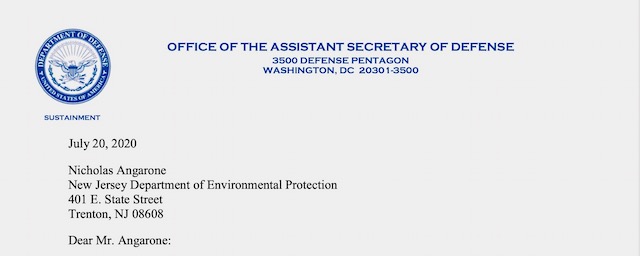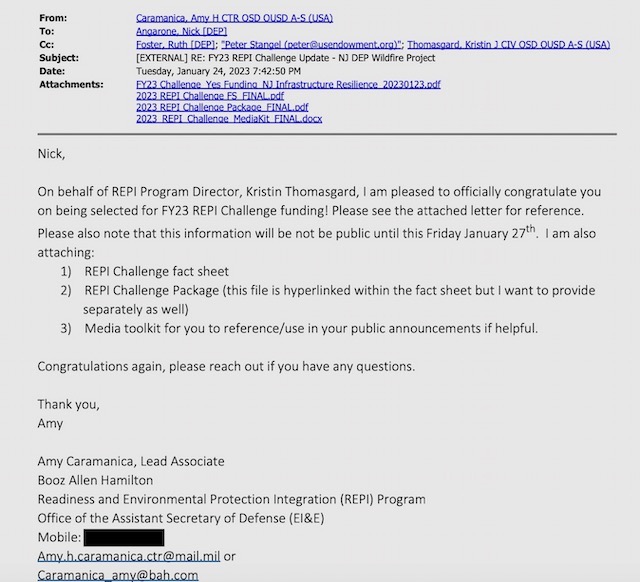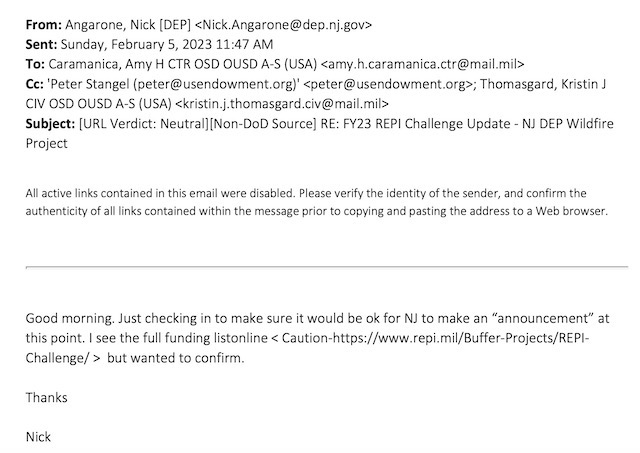DEP Designed Forestry Plan To Protect The Warren Grove Bombing Range
Military Demanded Secrecy During Pinelands Commission Review
DEP Plan Had Nothing To Do With Pinelands Ecology, Habitat, Or “Carbon Defense”
This is part 5 of a series on the military influence on DEP’s Pinelands logging schemes. (See prior posts:
In this detailed followup post, we show how:
- DEP lied to the Department of Defense by falsely claiming that their wildfire forestry project was “fully permitted”.
- DEP lied to the Pinelands Commission by failing to disclose the military objective and funding of the wildfire forestry project.
- DEP fabricated false justifications for the wildfire forestry project in their application for Pinelands Commission approval.
- DEP lied to the public and the media by failing to disclose the military funding and military objective of the wildfire project and claiming fabricated objectives.
In order to explain the abuse that went on here, I need to provide recent chronology.
The DEP received $1.94 million in a 2020 “REPI” grant from the Department of Defense (DoD). That grant funded the “Greenwood Triangle Forest Fire Mitigation Project” designed to protect Joint Base McGuire and the Warren Grove Bombing Range.
According to a July 20, 2020 letter to DEP from the Office of the Assistant Secretary of Defense:
These projects specifically focus on supporting key capabilities outlined in the Department of Defense’s (DoD) National Defense Strategy. The Strategy articulates DoD’s plan to improve military readiness by building a more lethal force, strengthening alliances and attracting new partners, and reforming DoD for greater performance and affordability.
That DoD letter specifically required DEP to keep this grant funding secret for at least a year:
Given the delay, there will be not be a formal announcement of 2020 REPI Challenge awards until next fiscal year. I ask that you please refrain from all outside communications regarding this decision, and delay any local announcements until we coordinate with you on a national announcement next fiscal year.
The DEP kept this information secret.
The DEP applied for a $5.07 million 2021 REPI grant on March 22, 2021. The application was denied by by DoD inMay 2021.
The DEP then sought additional DoD REPI grant funding in calendar year 2022. The DEP sought $5,993,000.
This application included the controversial Pinelands Forestry project.
The DoD deadline for submitting this application was September 12, 2022, so DEP submitted it BEFORE that deadline:
This DEP REPI grant application very clearly seeks funding for:
one new project: Warren Grove Wildfire Management Firebreak
The Warren Grove Wildfire Management Firebreak project was designed and justified by DEP as a plan to protect the Warren Grove Bombing Range.
The scope of work for the DEP 2022 REPI grant application (submitted to DoD prior to the September 12, 2022 deadline) falsely claimed that the forestry project was “fully permitted”:
REPI 2023 Forest Fire Service Projects Scope of Work FYs 2023/2024
Wildfire Mitigation –NJ Forest Fire Service Application project description
The two (2) NJ Forest Fire Service firebreak projects include the Greenwood Triangle project which is currently under construction utilizing REPI 2020 funding (Greenwood Triangle) and the proposed Warren Grove Wildfire Management Firebreak project. Both projects are fully permitted and ready to complete in 2023.
But the DEP Warren Grove Wildfire Management Firebreak project was NOT “fully permitted”.
During this timeframe, the DEP was seeking approval of the what the REPI application called the “Warren Grove Wildfire Management Firebreak”.
But the DEP application to the Pinelands Commission did not call the project the “Warren Grove Wildfire Management Firebreak” and it did not even mention military funding or the military objectives of protecting the Warren Grove Bombing Range.
In contrast to the DoD REPI grant application, the DEP application to the Pinelands Commission was titled (no mention of Warren Grove):
PROPOSAL FOR SILVICULTURAL ACTIVITY
ON STATE FOREST AND PARK LANDS
NEW JERSEY FOREST SERVICE
The DEP claimed the following activities, none of which mention military objectives:
The project has two main activities, (1) road maintenance/firebreak installation, and (2) silvicultural thinning, and forestry thinning and mowing for wildlife habitat restoration
Get that? The “forestry” was for “wildlife habitat restoration” (not Warren Grove Bombing Range protection).
Here is how DEP described the “intent” of the project:
V. Project Intent:
The range of forest density within both forest types of the proposed project presents significant wildfire fuel hazards, in addition to exceeding the threshold at which southern pine beetle (SPB) attack becomes a major risk. These issues have real potential consequences as major releases of carbon to the atmosphere through wildfire and mass mortality events. The proposed activities will address the dense volatile forest fuels and provide carbon defense for the future in an area plagued with historic wildfires, as well as create habitat more conducive for a variety of plant and wildlife species. In addition, these activities will provide significant protection of Atlantic white-cedar resources within the immediate (Bartlett’s Branch) and surrounding areas.
No mention of the Warren Grove bombing range.
The DEP application claimed the project was designed to promote a climate “carbon defense” policy:
The proposed project will significantly reduce the forest carbon pools throughout the site overall due to the removal of forest overstory. In particular, the flux in carbon before and after each of the treatments will change primarily from live aboveground carbon (removal of trees) to the dead wood pool (increase in slash, tops, etc.) due to harvesting activities. In addition, removed carbon may be utilized and stored by long-term forest products, stored within landfills, converted to energy, or may be left on site to be recycled back to the system depending on the implementation contractor and method of harvesting used to carry out the treatments. However, despite some carbon pool losses, this project will provide significant carbon defense to the surrounding forest through avoided emissions by reducing the risk of a rapid release of carbon to the atmosphere through catastrophic wildfire, including multiple Atlantic white-cedar stands and restored sites located along Bartlett’s Branch which contain significant carbon stores. This project will also allow for a break-up of the fuel ladder and will reduce the risk or likelihood of wildfire spread. Added benefits include making these stands more resilient under pressure from climate stressors such as drought or insect pest activity.
These project activities, intents, and objectives conflict with the DoD REPI grant application.
On February 4, 2022, DEP Commissioner LaTourette sent a highly unusual letter to the Pinelands Commission, demanding rapid approval and threatening a lawsuit if they failed to do so. LaTourette’s letter described the project, but made no mention of REPI application, military objectives, or military funding.
The public comment period on the DEP Pinelands application closed on September 9, 2022.
At this time, the DEP was still maintaining the secret demanded by DoD and had not publicly disclosed the REPI application for the same project they were seeking Pinelands approval for. Accordingly, the public could not comment on the real intents and objectives of the forestry project.
Despite not knowing anything about all this due to misconduct and obstruction by the Pinelands Commission staff, I tried to submit comments as soon as I learned of the project. But my comments were submitted too late: (Counselor Stacy Roth email, 10/11/22)
Consequently, we are unable to add your October 9, 2022 comments to the record for this matter. You are welcome to call into the Commission meeting on October 14th to discuss your concerns. Any such discussion will have to occur after the Commission has rendered a decision on the application.
The Pinelands Commission voted to approved the DEP wildfire plan on October 14, 2022:
Dear Mr. Sacco:
Enclosed is a copy of the Resolution adopted by the Pinelands Commission at its meeting on October 14, 2022.
The Commission approved 1,304 acres of forestry and the creation of approximately 13 miles of forest fire fuel break within the above referenced road rights-of-way and on the above refenced (sic) parcel subject to the conditions recommended by the Acting Executive Director.
The DEP submitted the REPI grant application prior to the September 12, 2022 deadline and LONG before the Pinelands Commission and public review of and approval of the project on October 14, 2022.
The DoD again required that this project REPI funding be kept secret, until January 27, 2023:
Conclusions
Based on a detailed review of the documents and chronology, it is obvious that the DEP provided inconsistent and conflicting justifications for the project: one in the DoD REPI grant application and one in the Pinelands application.
The DEP falsely claimed to DoD that the project was “fully permitted”, but the REPI grant application submission deadline was Sept. 12 and the Pinelands Commission did not approve until Oct. 14. DEP also misled the Pinelands Commission, the public and the press about the objectives of the project.
The DEP kept this all secret and asked the DoD for permission to publicly announce the REPI grant on in a February 5, 2023 email – long AFTER Pinelands Commission approval:
More to follow.
[End Note: On top of all the deception and bad forestry policy, this Pentagon DoD program is run by a private contractor, Booz Allen Hamilton.]





Pingback: WolfeNotes.com » The DEP Considers Virtually The Entire NJ Pinelands As A “Military Influence Area”